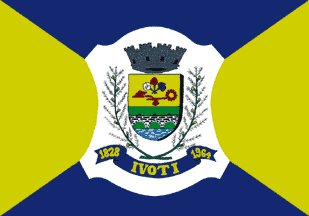 image by Dirk Schönberger,
21
February 2012
image by Dirk Schönberger,
21
February 2012Source: http://www.ivoti.rs.gov.br/simbolos-municipais

Last modified: 2020-07-25 by ian macdonald
Keywords: rio grande do sul | ivoti |
Links: FOTW homepage |
search |
disclaimer and copyright |
write us |
mirrors
 image by Dirk Schönberger,
21
February 2012
image by Dirk Schönberger,
21
February 2012
Source:
http://www.ivoti.rs.gov.br/simbolos-municipais
The municipality of Ivoti (19,877 inhabitants in 2010; 63 sq. km) is located in the Porto Alegre Metropolitan Area, 60 km of Porto Alegre. The municipalities of Presidente Lucena (former district of Arroi Veado) and Lindolfo Collor (former district of Picada Capivara) seceded from Ivoti on 20 March 1992. Ivoti originates in the colony of Bom Jardin (Good Garden), founded in 1826 by 48 German families coming from the Hunsrück region. THe development of the colony required the building of a bridge over river Feitoria; built in 1857-1864, the bridge was named the Emperor's Bridge as a tribute to his patron, Emperor Peter II. To be protected from the flood of the Feitoria, the village was relocate uphill, where the present-day town stands. The district of Bom Jardin was established, as the 3rd district of the municipality of São Leopoldo, by Provincial Law No. 635 of 4 November 1867. The district as renamed Ivoti ("flower", in Tupi-Guarani) by State Law No. 7,199 of 31 May 1938. In 1966, the municipal administration allocated land to 26 Japanese families, who developed grapes, kiwi and flower cultivation in the municipality. Ivoti industrialized and urbanized in the 1970s, when the merging leather industry attracted manpower from northern Rio Grande do Sul and Santa Catarina. The municipality of Ivoti ("flower", in Tupi-Guarani) was established by State Law No. 4,798 of 19 October 1964, following a plebiscite held on 12 July 1964, and inaugurated on 26 January 1965.
Ivan Sache, 19 July 2020
Divided per saltire, blue above and below, yellow to hoist and fly, with the municipal arms on a large white shield in the centre.
Official website at
http://www.ivoti.rs.gov.br
Dirk Schönberger,
21 February 2012
The flag of Ivoti is prescribed by Municipal Law No. 198 promulgated on 18
October 1973.
Flag in rectangular shape, divided in four triangles
represented in two colors, blue and yellow. The triangles have one of their
points converging to the rectangle's center, where they are superimposed with a
stylized leather piece charged in the center with the coat of arms of the
municipality of Ivoti. The stylized peace of leather represents Ivoti's industry
and the main products derived of it. The coat of arms represents the
municipality.
The colors form the triangles, as follows:
- 1st triangle,
blue, converging to the center from the rectangle's lower base;
- 2nd
triangle, located at the right of the rectangle's lower base;
- 3rd triangle,
blue, converging to the center from the rectangle's upper base;
- 4th
triangle, yellow, converging to the center from the rectangle's lateral side,
located left of the rectangle's base.
The two points of each triangle run
from bases and lateral sides to the rectangle's center, from the rectangle's
corners is formed the third point of the triangle, which is not visible, being
superimposed by the stylized piece of leather.
The coat of arms of Ivoti
is prescribed by Municipal Law No. 126 promulgated on 11 September 1970.
A Portuguese shield, per pale or and vert (green), containing in chief three
fleurs-de-lis gules (red) and azure (blue) in saltire centered on the panel,
dexter a Minerva's helmet gules (red), sinister a cogwheel gules, in base in
between a plow gules. In base a three-arched bridge sable (black) spanning over
river Feitoria wavy argent.
The shield supported, dexter and sinister, by two
branches of flowered black wattle. A scroll azure charged with "1828 - Ivoti -
1964" or. The shield surmounted by a four-towered mural crown argent.
The
flower represents the title of "Flowers' Town", as well as the soil's beauty and
fertility; the symbols of commerce, industry and agriculture - winged helmet,
cogwheel and plow - represent the municipality's living forces and its
economical power; the bridge known as the Emperor's bridge spanning over river
Feitoria is an historical ornament, recalling the early times of Ivoti, once
known as Bom Jardim, when the German colonization made miracles to develop and
enrich the municipality of Ivoti. The branches of black wattle represent one of
the municipality's main sources of income. The scroll azure inscribed or
represents the enchanting sky, and the mural crown the elevation to a town in
1964.
The colors of the arms are the national and Riograndense colors; they
are also emblematic of the qualities, nobleness, kindness and dexterity of the
inhabitants of Ivoti.
http://www.ivoti.rs.gov.br/simbolos-municipais
Municipal website
Photos
https://www.facebook.com/prefeitura.ivoti/
https://www.facebook.com/prefeitura.ivoti/
https://www.facebook.com/prefeitura.ivoti/
https://www.facebook.com/prefeitura.ivoti/
Ivan Sache, March 2012